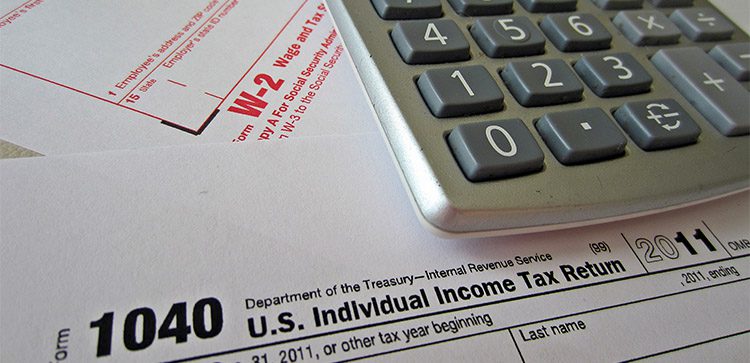The pandemic has impacted every aspect of life, including tax filing deadlines. Rather than the usual April 15, the filing deadline for your 2020 return has been extended to May 17.
Of course, Americans living outside the United States have until June 15 to file their return each year, with or without the pandemic.
Here’s what else Americans living abroad or who have investments outside the United States need to understand regarding their obligations to Uncle Sam each year.
You Must File
 The first thing to know is that you must file a return every year no matter where in the world you’re living and no matter how long you’ve lived outside the United States. You may or may not owe tax, but, as long as you carry your blue passport with the gold eagle on the cover, you do owe Uncle Sam paperwork annually.
The first thing to know is that you must file a return every year no matter where in the world you’re living and no matter how long you’ve lived outside the United States. You may or may not owe tax, but, as long as you carry your blue passport with the gold eagle on the cover, you do owe Uncle Sam paperwork annually.
The Foreign Earned Income Exclusion
Part of the answer to whether or not you owe tax to the IRS each year has to do with the Foreign Earned Income Exclusion (FEIE). The United States insists on tracking your income and assets no matter where in the world you live, but it does offer the FEIE to help mitigate how much tax you owe on your worldwide income. It’s the biggest tax benefit you have as an American working and earning income overseas… if you qualify.
You qualify in one of two ways—through the physical presence test or the bona fide resident test.
The physical presence test is fairly black and white. To qualify for the FEIE this way, you have to be physically present in a foreign country for 330 days in a 12-month period. The wording of the rule is such that it’s not days outside the United States but days in a foreign country. This seemingly small twist can create a problem for people working in maritime industries (days in international waters aren’t days in a foreign country), for example.
Ordinarily, though, it’s fairly straightforward to determine whether you pass this test or not.
The bona fide residency test isn’t as black and white. Holding a residency permit for another country is only the starting point to qualify for the FEIE this way. Every case is different, but, bottom line, you also must meet other criteria.
One factor that helps your case with the IRS is being able to show that you are liable for taxes in your country of residency. Most everyone living full time in another country should fall into that category, but it is possible to be a resident of a country without necessarily being a tax resident of that country.
Your housing situation can also help solidify your bona fide residency status. It helps if you do not maintain a residence in the United States and if you have invested in a home in the foreign country where you’re living. It’s not that keeping a house in the United States will disqualify you from the FEIE, but, if other factors don’t clearly show where you are resident, you might be disqualified.
Having kids who go to school in the foreign country, owning a car there, having a local driver’s license, being a member of local organizations—these kinds of things provide further evidence of your status as not resident in the United States.
If you qualify for the FEIE using the bona fide residency test, then you don’t have to worry about how many days you’re in a foreign country (or how many days you’re in the United States).
The FEIE is calculated on Form 2555. You’ll be asked to detail information about your earnings, which test you want (or need) to qualify under, and your employer’s information.
Only earned income is eligible. You cannot use the FEIE to mitigate any tax you owe on passive income.
The Foreign Housing Exclusion
In addition to the Foreign Earned Income Exclusion, if you’re working and receiving earned income in another country, you may also qualify for the Foreign Housing Exclusion (FHE). It applies if you are renting your residence while earning income in a foreign country.
Like the FEIE, you calculate this on Form 2555.
If You’re Self-Employed
If you’re self-employed as the sole proprietor of a business while working and living overseas, you’ll not only pay Social Security and Medicare taxes as you would if you were in the United States (both the employer and employee parts), but you’ll also have your FEIE reduced by your business expenses.
From a tax point of view, you can be better off setting up a foreign corporation for your non-U.S. business.
Foreign Bank Accounts
If you have one or more bank accounts outside the United States, you owe the U.S. government what was originally referred to as the Foreign Bank Account Report every year. The threshold for filing the FBAR hasn’t changed since the form was introduced decades ago, though the form name and how and when you file it have.
Now officially the FinCEN Form 114, this is where you list all your offshore financial accounts and how much money each one holds. The form must be filed electronically online.
If you have US$10,000 or more (or the foreign currency equivalents) in one or more financial account(s) at any time during the calendar year, you have to file the form. The “at any time” part can catch you up. For example, if you open a bank account in Colombia to buy a piece of property and send US$100,000 to the account for the purchase, you meet the requirements for filing the FBAR even if that money is in the account for a single day.
The threshold is an annual test. Returning to the Colombia example, if you open an account in Colombia to buy a piece of property in 2021 and transfer US$100,000 for the purchase, you must file the FBAR. However, if then in 2022 you use the account only for paying local bills and the account never contains US$10,000, you don’t have to file for 2022.
The US$10,000 threshold is for aggregate balances at any time during the year. One account holding US$10,000 or more meets the requirement, as do 10 accounts containing US$1,000 apiece or more on a single day. The number of accounts isn’t the trigger, and neither is the amount in any one account. It’s the highest aggregate value on any given day.
Note that the FBAR isn’t an IRS form; it’s a Treasury Department form (the IRS’ boss). However, the filing date for the FBAR is the same as your tax return. In a usual year, that means April 15 unless you file for an extension. Those living outside the United States get an automatic extension to file until October 15. This is an informal allowance and could change at any time. To avoid missing the deadline, it can be smart to file the FBAR by April 15. You don’t want to run the risk of forgetting about it. The penalties for not filing are draconian.
Foreign Financial Assets
The foreign financial accounts reported on the FBAR can be a subset of total foreign financial assets you might hold.
The U.S. government defines foreign financial assets as “any financial account maintained by a foreign financial institution” and “to the extent held for investment and not held in a financial account, any stock or securities issued by someone that is not a U.S. person, any interest in a foreign entity, and any financial instrument or contract with an issuer or counterparty that is not a U.S. person.”
You use Form 8938 to report any foreign financial assets that meet the threshold. It’s possible to meet the requirements for Form 8938 without meeting the requirements for the FBAR and vice versa. You have to look at each reporting threshold individually.
If you’re living in the United States, you are required to complete Form 8938 if you have foreign financial assets of more than US$50,000 on the last day of the year or of more than US$75,000 at any point during the year. Those are the amounts for single filers. The amounts double for married couples filing joint returns.
If you live outside the United States, the threshold amounts move to US$200,000 on the last day and to US$300,000 during the year for singles and double that for married filing jointly. While foreign financial accounts get reported on Form 8938 even if they are reported on the FBAR, certain other assets don’t have to be reported on this form if they are reported elsewhere, including foreign trusts and foreign corporations.
Double Taxation
If you’re earning money in a foreign country where you’re investing or doing business, taxes paid in that country on income that is also taxable in the United States is generally recoverable as a foreign tax credit or a tax deduction. Taking the tax credit is almost always the better option.
Sincerely,

Kathleen Peddicord
Founding Publisher, Overseas Opportunity Letter










